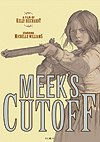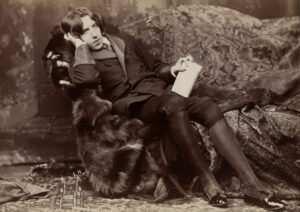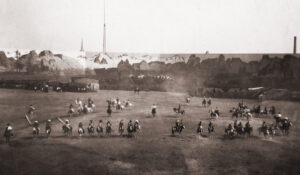
Meek’s Cutoff, Oscilloscope Laboratories, 2010, PG (2011 DVD)
Thankfully this unusual Western is only 104 minutes long. Another 16 or so minutes on the Meek Cutoff of the Oregon Trail in 1845 might have killed me, and it has nothing to do with dullness (although the picture sometimes creeks along like a worn wagon wheel). It has more to do with the seeming “realism” of a Kelly Reichardt film that makes you feel like part of an actual westbound journey. The real-life 19th-century pioneers spent months on the trail, but I only needed about 15 minutes of viewing pleasure (using that word loosely) to confirm my suspicion that I was not cut out to be on the cutoff or even on the main trail. Well, maybe I could have hacked it had I had a strong woman like Emily Tetherow (portrayed by Michelle Williams) along for more than just the long ride. She is a cut above the other women (cowering and subservient) and men (simple followers) in dealing with the endless dry emptiness and the Indian “threat.” That’s not saying much; they all seem (understandably) a bit undone by this experience, although Reichardt doesn’t explore their personalities in detail. The dominant character here is definitely the landscape, even if Bruce Greenwood as Stephen Meek chews up some scenery as a callous, blowhard “Buffalo Bill” look-alike who turns out to be a guide without a clue.
In the real West of 1845, mountain man Stephen Hall Meek (older brother of the more famous mountain man Joe Meek) guided a wagon train on a branch of the Oregon Trail that became known as Meek Cutoff. Some 1,000 emigrants and 200 wagons followed Meek across desolate land in Oregon where no wagons had previously ventured, and they met much hardship and death. In the movie only seven people in three wagons have followed Meek (that in itself sounds like a prescription for disaster), but their hardships (illness, accidents, lack of water, the uncertainty of what lies ahead) are much the same.
This is the opposite of an action picture; there is plenty of movement, but it is slow and vaguely westward. The storyline centers on a wandering Indian (well played by Rod Rondeaux) who might be a savage who doesn’t savvy their language, but who just might know where he is going and where water can be found. That’s more than can be said for Meek the misguided guide. Whether any or all of Reichardt’s “lost” emigrants will die is left an open question, as the picture ends in unconventional fashion. Meek’s Cutoff packs enough vision to trigger philosophical thoughts and make anyone glad the transcontinental railroad came along two decades later.
—Editor




